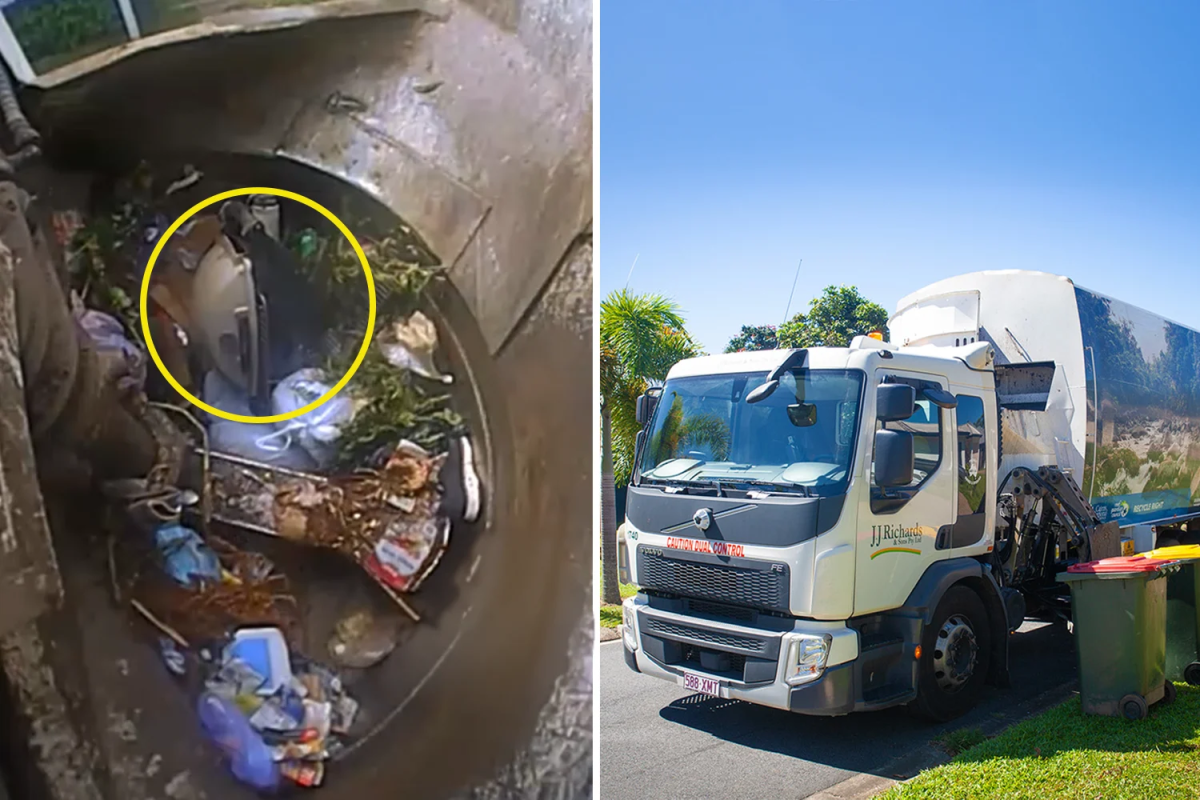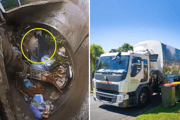
Every single day, about 30 garbage trucks and waste facilities across Australia burst into flames. That's more than 10,000 fires each year, and the culprit might surprise you—it's often something as seemingly harmless as the old mobile phone battery sitting in your junk drawer.
The recent incident in Cairns, where a small barbecue sparked a garbage truck fire and prompted warnings of $3,000 fines, represents just the tip of a blazing iceberg that's costing Australian communities millions of dollars and putting waste workers at serious risk.
In this article
The numbers that should shock us all
In Australia more than 450 fires have been linked to lithium-ion batteries over the past 18 months, with WA recording 81 lithium-ion related fires in the last year compared to 21 in 2018, NSW recording 180, 120 in VIC and 72 in QLD.
But it's not just the frequency that's alarming—it's the acceleration. So far in 2025, there have been 25 lithium-ion-related fires reported to Fire and Rescue NSW alone, compared to just over 16 in the entire year of 2021.
'Every year, we see fires breaking out in garbage trucks and recycling facilities because people are throwing batteries in household bins'
The Cairns Regional Council's warning about their recent Baby Q barbecue fire isn't an isolated incident—it's part of a national emergency that's escalating rapidly.
Recent incidents include four fires in just a month at the City of Canterbury Bankstown, with Australia's peak waste organisations calling for urgent action on the growing hazard.
When convenience becomes costly
The financial impact is staggering. A recent fire caused at least $150,000 damage to an EastWaste collection truck in the Adelaide Hills, and that's just one incident.
These costs inevitably flow through to ratepayers and communities through higher waste management fees and insurance premiums.
In Canterbury Bankstown, dramatic footage shows a truck's load catching fire after a large lithium battery was thrown in a recycling bin, with the driver having to navigate for seven nerve-racking minutes to find a safe dumping location.
The hidden costs of bin fires
Each truck fire can cost $150,000+ in damages
Service disruptions affect entire collection routes
Emergency service call-outs strain local resources
Insurance premiums rise for all councils
Replacement trucks take months to procure
The problem isn't just about money—it's about human safety. Industry experts describe these fires as 'quite terrifying' and note they're 'difficult to extinguish', putting waste collection crews and nearby residents at genuine risk.
The culprits hiding in our homes
While the Cairns incident involved a barbecue, many of these incidents are a direct result of waste contaminated with lithium batteries and other household batteries, which are a no go for kerbside bins.
The most dangerous items commonly found in household rubbish include:
- Lithium-ion batteries from phones, laptops, power tools, and cameras
- Vape devices (often with active batteries still inside)
- Gas cylinders and small barbecues like Baby Q units
- Electronics with embedded batteries such as toys, remotes, and hearing aids
- Power tool batteries and chargers
Items that never belong in household bins
- Any device with a battery (removable or built-in)
- Gas cylinders and camping equipment
- Aerosol cans and chemical containers
- Paint tins and household chemicals
- Car batteries and power tool batteries
The simple solution that could save lives
Despite these alarming statistics, the solution is remarkably straightforward and convenient.
Currently in Australia, only 10 per cent of batteries are recycled, even though 95 per cent of the materials from batteries can be extracted and used for manufacturing new products.
Australia has a national recycling scheme for batteries with thousands of recycling locations available across the country through the B-cycle program, which has partnered with approximately 100 organisations to provide recycling drop-off points.
For seniors, the most accessible options include:
- Bunnings stores: All stores have battery recycling units, making it convenient for customers to drop off used batteries with confidence [11]
- Major supermarkets: Most Coles and Woolworths stores have battery collection points
- Council offices and libraries: Free drop-off points in most communities
- Officeworks and electronics retailers: Accept various battery types
What you can do right now
The Queensland penalties outlined in the original Cairns warning—up to $3,338 for individuals—reflect the seriousness of this issue. But rather than focusing on punishment, the emphasis should be on prevention through proper disposal habits.
Before disposing of any battery:
- Tape the terminals with regular tape to prevent sparking
- Check for damage - swollen or leaking batteries need special handling
- Store safely in a cool, dry place until you can dispose of them
- Remove from devices where possible rather than throwing away the whole item
A shared responsibility for safer communities
The dramatic increase in waste fires—from 21 incidents in WA in 2018 to 81 in the past year alone—shows this problem is accelerating faster than awareness is spreading.
Survey data reveals one in four people (25 per cent) are still putting batteries in their rubbish bins, despite the growing fire risks.
For Australia's senior community, many of whom remember when batteries were simpler and less dangerous, adapting to these new disposal requirements isn't just about avoiding fines—it's about protecting the waste workers who collect our rubbish and keeping our communities safe.
The next time you're replacing the batteries in your TV remote, smoke alarm, or hearing aid, remember that taking them to your local Bunnings or supermarket instead of the bin could prevent a $150,000 fire and keep someone's workplace safe.
Did you know?
Did you know?
Envirostream, Australia's first onshore lithium battery processor, can recover 95 per cent of battery materials including steel, copper, aluminium, graphite, cobalt, nickel and lithium, which are then used to produce new lithium-ion batteries
What's your experience with battery disposal in your local area? Have you noticed the collection points at your regular shopping spots, and do you think more awareness is needed in our communities? Share your thoughts and help spread the word about this important safety issue.
Original Article
https://au.news.yahoo.com/councils-...ergency-situation-061159752.html?guccounter=1
The waste industry’s fight for fire safety | Cleanaway
Cited text: In Australia more than 450 fires have been linked to lithium-ion batteries over the past 18 months, according to data provided by state fire departmen...
Excerpt: In Australia more than 450 fires have been linked to lithium-ion batteries over the past 18 months, with WA recording 81 lithium-ion related fires in the last year compared to 21 in 2018, NSW recording 180, 120 in VIC and 72 in QLD
https://www.cleanaway.com.au/sustainable-future/waste-fire-safety/
***VISION ALERT: Spate of lithium-ion fires and NSW Government survey sparks community wakeup call on battery risks—Sydney—Fire and Rescue NSW
Cited text: So far in 2025, there have been 25 lithium-ion-related fires.
Excerpt: So far in 2025, there have been 25 lithium-ion-related fires
https://www.fire.nsw.gov.au/incident.php?record=rec3uefLyukfVBoB9
Fires ignite waste warning—Waste Management Review
Cited text: It follows a scourge of fires within the waste and recycling sector, including four in just a month at the City of Canterbury Bankstown, New South Wal...
Excerpt: Recent incidents include four fires in just a month at the City of Canterbury Bankstown, with Australia's peak waste organisations calling for urgent action on the growing hazard
https://wastemanagementreview.com.au/fires-ignite-waste-warning/
Fires ignite waste warning—Waste Management Review
Cited text: https://wastemanagementreview.com.au/wp-content/uploads/2024/10/12.36-Hopper.mp4 · On Tuesday, a fire caused at least $150,000 damage to an EastWaste ...
Excerpt: A recent fire caused at least $150,000 damage to an EastWaste collection truck in the Adelaide Hills
https://wastemanagementreview.com.au/fires-ignite-waste-warning/
Fires ignite waste warning—Waste Management Review
Cited text: One of the latest incidents occurred when a large lithium battery was thrown in a recycling bin at an apartment block. Dramatic footage of the inciden...
Excerpt: In Canterbury Bankstown, dramatic footage shows a truck's load catching fire after a large lithium battery was thrown in a recycling bin, with the driver having to navigate for seven nerve-racking minutes to find a safe dumping location
https://wastemanagementreview.com.au/fires-ignite-waste-warning/
Fires ignite waste warning—Waste Management Review
Cited text: “These fires have become such a prevalent issue because there are a lot of embedded batteries and people aren’t aware of how volatile they are, or dif...
Excerpt: Industry experts describe these fires as 'quite terrifying' and note they're 'difficult to extinguish'
https://wastemanagementreview.com.au/fires-ignite-waste-warning/
The waste industry’s fight for fire safety | Cleanaway
Cited text: Many of these incidents are a direct result of waste contaminated with lithium batteries and other household batteries, which are a no go for kerbside...
Excerpt: many of these incidents are a direct result of waste contaminated with lithium batteries and other household batteries, which are a no go for kerbside bins
https://www.cleanaway.com.au/sustainable-future/waste-fire-safety/
Spike in garbage truck fires prompts safety warning for battery disposal—Waverley Council
Cited text: “Currently in Australia, only 10 per cent of batteries are recycled, even though 95 per cent of the materials from batteries can be extracted and used for manufacturi...
Excerpt: Currently in Australia, only 10 per cent of batteries are recycled, even though 95 per cent of the materials from batteries can be extracted and used for manufacturing new products
https://www.waverley.nsw.gov.au/top...s_prompts_safety_warning_for_battery_disposal
Battery Recycling—Planet Ark Recycling Near You
Cited text: Australia has a national recycling scheme for batteries with thousands of recycling locations available across the country.
Excerpt: Australia has a national recycling scheme for batteries with thousands of recycling locations available across the country through the B-cycle program, which has partnered with approximately 100 organisations to provide recycling drop-off…
https://recyclingnearyou.com.au/batteries/
Battery Recycling—Planet Ark Recycling Near You
Cited text: Australia’s national product stewardship scheme for battery recycling is called B-cycle. This program has partnered with approximately 100 organisatio...
Excerpt: Australia has a national recycling scheme for batteries with thousands of recycling locations available across the country through the B-cycle program, which has partnered with approximately 100 organisations to provide recycling drop-off…
https://recyclingnearyou.com.au/batteries/
Where And How To Recycle Batteries—Bunnings Australia
Cited text: All our stores have battery recycling units, making it convenient for customers and tradies to drop off used batteries with confidence, knowing they’l...
Excerpt: All stores have battery recycling units, making it convenient for customers to drop off used batteries with confidence
https://www.bunnings.com.au/diy-adv...-recycling/where-and-how-to-recycle-batteries
***VISION ALERT: Spate of lithium-ion fires and NSW Government survey sparks community wakeup call on battery risks—Sydney—Fire and Rescue NSW
Cited text: “This insightful survey shows one in four people (25 per cent) are still putting batteries in their rubbish bins and we need to do better. “Batteries must be ...
Excerpt: Survey data reveals one in four people (25 per cent) are still putting batteries in their rubbish bins, despite the growing fire risks
https://www.fire.nsw.gov.au/incident.php?record=rec3uefLyukfVBoB9
Battery Recycling—Planet Ark Recycling Near You
Cited text: Envirostream, Australia’s first onshore lithium, nickel metal and alkaline battery processor, is able to recover 95 per cent of the materials in the batteries...
Excerpt: Envirostream, Australia's first onshore lithium battery processor, can recover 95 per cent of battery materials including steel, copper, aluminium, graphite, cobalt, nickel and lithium, which are then used to produce new lithium-ion batteries
https://recyclingnearyou.com.au/batteries/







